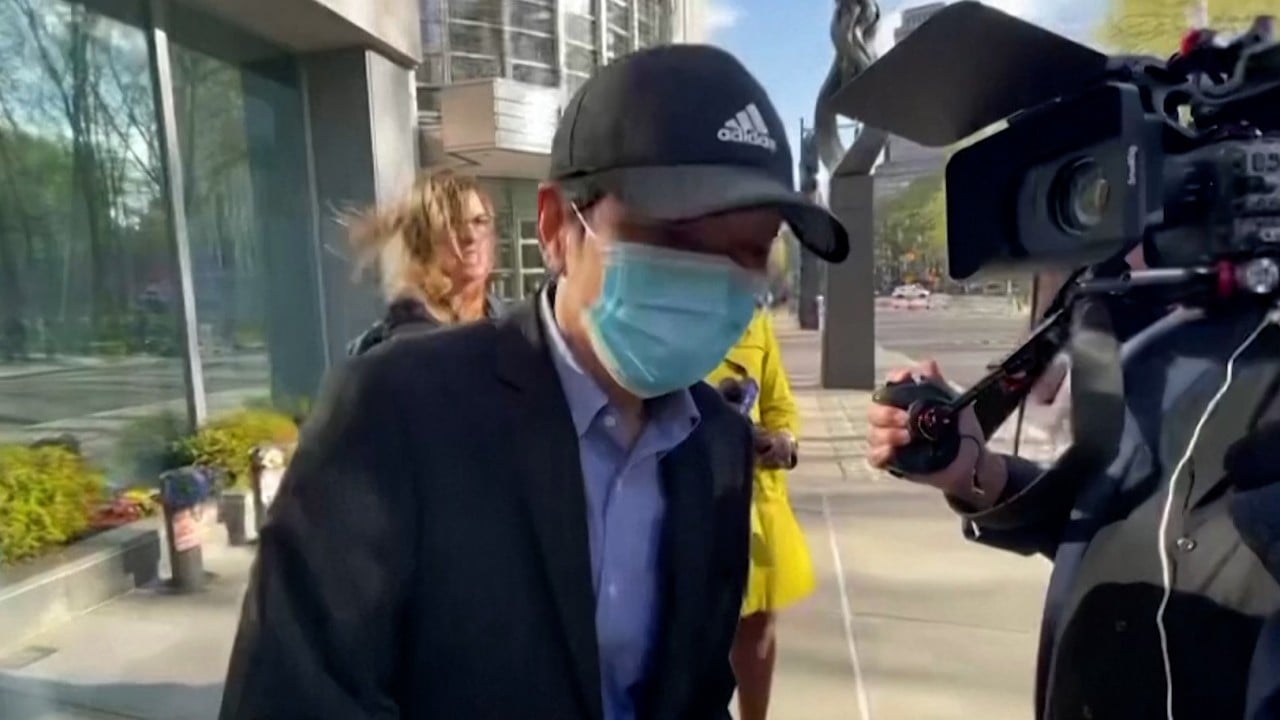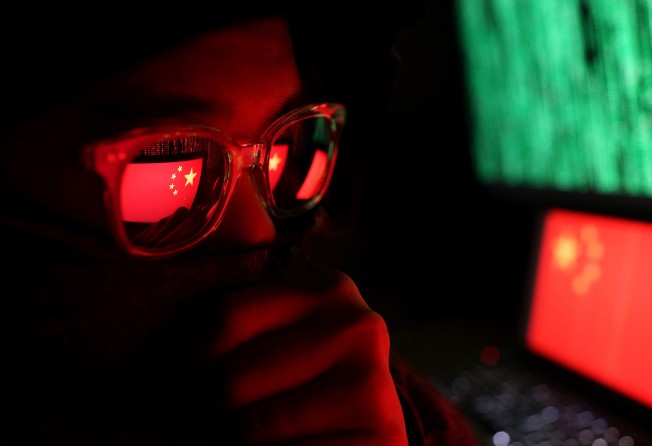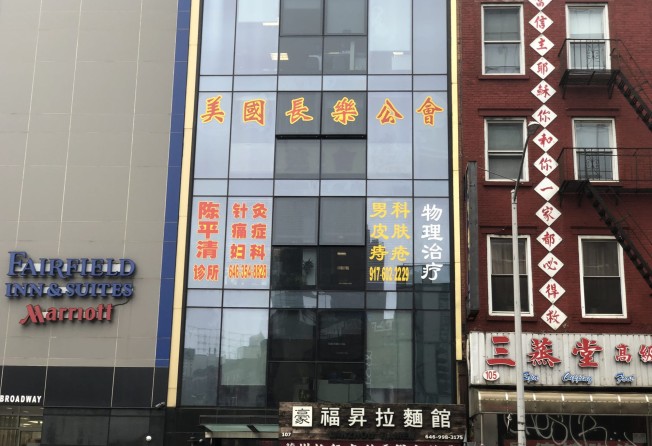
02:22
US federal agents arrest 2 men for running Chinese ‘secret police station’ in New York

Western countries have again called for China’s “secret police stations” to be shut down after governments in Europe and North America put the spotlight back on Chinese operations overseas.
On May 15, Germany’s foreign ministry said it believed China had continued to operate the “illegal overseas police stations”, despite earlier promises from Beijing it would close what it called “service stations”.
A day earlier, Canadian Public Safety Minister Marco Mendicino said there could be more “secret police stations” operating across the country, months after investigations were launched into two centres in Montreal.
The latest calls come just a month after United States authorities arrested two New York residents of Chinese descent suspected of operating one such station out of a commercial office in Manhattan’s Chinatown.
Beijing categorically denies the stations are used for extraterritorial law enforcement or overseas spying, and some analysts say the role of these stations could be exaggerated.
Starting in September, human rights organisation Safeguard Defenders released reports alleging that China’s Ministry of Public Security was operating more than 100 overseas police stations in as many as 53 countries.
The outposts, which have allegedly been operating as far back as 2016, were established by regional police bureaus from cities in southeastern China, such as Fuzhou, Nantong, Wenzhou and Qingtian.
Investigations have found stations operating out of businesses and commercial buildings in areas frequented by Chinese diaspora communities.
Safeguard Defenders said the stations acted as vehicles for the ministry’s “persuade to return” operations, which target fugitives living overseas – such as scammers or corrupt businesspeople – to go back to China to face prosecution.
However, the stations have also been linked to the alleged monitoring and threatening of dissidents and pro-democracy activists, including non-Chinese citizens.
Though not police officers themselves, the outposts’ personnel have been accused of using various methods of intimidation, such as online harassment and the coercion of families.
Some Western governments have called the alleged operations “unacceptable” and “outrageous”, accusing Beijing of operating illegal overseas law enforcement, violating international norms and flagrantly interfering in their domestic affairs.
Beijing has repeatedly denied that the stations are overseas police stations. Instead, it says they are used to provide bureaucratic services such as driving licence renewal.
“The relevant institutions helped overseas Chinese who could not return to China due to the pandemic,” foreign ministry spokesman Wang Wenbin said on May 15, adding that the services provided had since moved online and that the stations had been closed down.
Rather than police officers or government employees, Beijing maintains that the stations were staffed by local volunteers seeking to help their communities. Investigations by authorities in the US and elsewhere have corroborated some of Beijing’s assertions.
While China’s foreign ministry has said China is cracking down on transnational crimes, it said all operations were in line with international law and that Western allegations to the contrary were “smearing” and “disinformation” based on hearsay.
Telecoms and online fraud have been rampant in China in recent years. In September, China passed a law giving authorities the power to pursue suspects abroad, although the law stipulates it must be done in conjunction with international law enforcement agencies.
Since 2014, China has also engaged in “Operation Fox Hunt”, the state-sanctioned pursuit of suspected financial criminals or those facing corruption charges who have fled the country.
“China always upholds the principle of non-interference in other countries’ internal affairs, strictly observes the international law and respects the judicial sovereignty of all countries,” Wang said.
The most high-profile action taken against these “police stations” was the arrest of New York residents Lu Jianwang, 61, and Chen Jinping, 59, by US authorities on April 17.

They have been charged with “conspiring to act as agents of the PRC government” as well as obstruction of justice for allegedly “destroying evidence” related to correspondence with officials from the Ministry of Public Security. The station they allegedly operated was closed in autumn 2022 after it was searched by US federal agents.
A growing list of other countries, from Britain to Austria, have launched their own investigations or probes into the “police stations” and their alleged criminal activities.
In Canada, police said they were investigating two Chinese community groups who allegedly operated “secret police stations” in Montreal, although later local media reports suggest the groups continued to operate.
The foreign ministries of both Ireland and the Netherlands said they had addressed the matter directly with China’s respective ambassadors. There is also mounting domestic pressure in countries such as Japan, where opposition parties are calling on the Japanese governmentto release more information about these stations.
Some countries, including Italy and Serbia, previously established joint patrol partnerships between Chinese police officers and local forces. The programmes were pitched as a way to help with the growing number of Chinese tourists visiting overseas destinations.
However, in December Italy announced it would stop the programme – which had been suspended during the Covid-19 pandemic – in light of the report by Safeguard Defenders.
Jeremy Daum, a senior fellow at Yale Law School’s Paul Tsai China Centre, called the narrative building around these stations a “distraction” from other transnational actions taken by Beijing.
“I believe extraterritorial harassment by Chinese authorities and ultranationalist citizens is a real problem [but] the role of these police stations in that is probably minimal,” Daum said.
Following the initial release of the Safeguard Defenders report, Daum highlighted that the stations operated openly in the communities they were based in and essentially acted as video conference rooms for mediation and other services.
He also noted after the New York arrests that the US Department of Justice presented little connection between the alleged actions of Lu and Chen with the stations themselves.
Daum said he feared the focus on “overseas police stations” was part of “a growing trend of considering everyone with perceived ties to China, be it by ethnic heritage, business, etc … as a potential agent of the [Chinese Communist Party]”.
Regardless of whether they were used for transnational law enforcement, the controversy was further damaging Beijing’s image in the West, said Chong Ja Ian, an associate professor of political science at the National University of Singapore.
“Such alleged action raises doubts about the actuality of [China’s] commitment to rule of law and respect for sovereignty despite official statements otherwise,” Chong said. “Even if the outposts are for standard administrative procedures, they still need some sort of registration.”
Chong and Daum both said that ongoing judicial proceedings in places such as the US should “shine more light” on the station’s operations.
On Tuesday, Safeguard Defenders said it had been the target of a “prolonged” disinformation campaign involving tens of thousands of fake social media accounts since the release of the initial report in September.
On YouTube and other websites, thousands of virtually identical videos and blog posts have appeared under a similar name to the group’s original report, but they contain a 669-word defence of China’s position on the matter.
On Twitter, references to the reports were temporarily banned after a mass of suspected bot accounts triggered the social media site’s anti-spam filter.
Twitter’s overhaul of its verification scheme allowed thousands of accounts to masquerade as Safeguard Defenders, the group said. While the social media site has reportedly removed as many as 1000 “impostor” accounts, a search by the South China Morning Post showed hundreds of accounts using the same name, profile picture, and bio as Safeguard Defenders remained on the site.
The campaign was “seemingly aimed at drowning out the messaging and online visibility of Safeguard Defenders,” the group said in a press release.
It added that its previous reports on China have triggered similar waves of online harassment, but the group stopped short of calling it a state-coordinated operation.
“There is no way to know whether this campaign has State-backing, but the scale of operation and its uniformity indicates a single body is directing it,” Safeguard Defenders said.